Karen Layher Retires as Grant County Auditor After 30 Years
Local News February 21, 2023 Staff 0
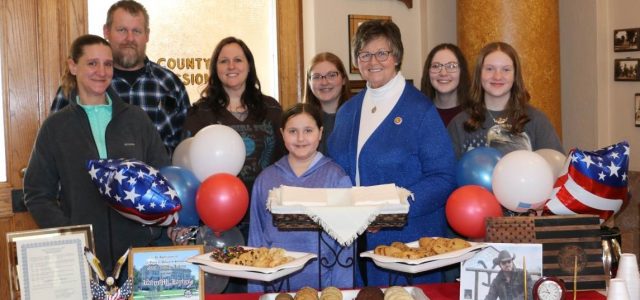
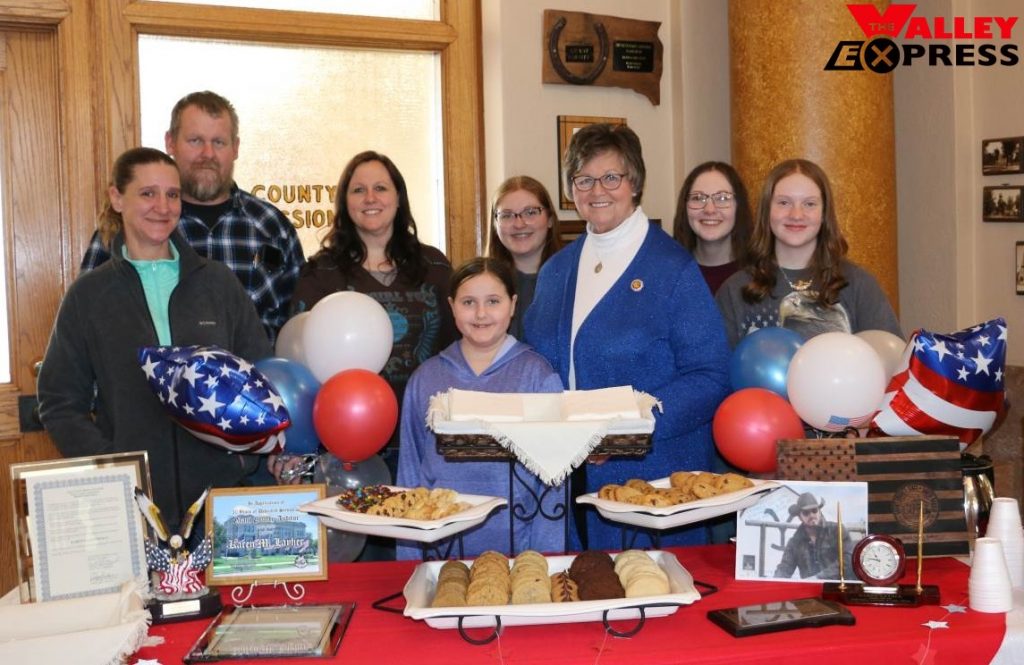
Thursday, October 1, 1992, was a day like most others. The news was running stories about the recent opening of the Mall of America and Cartoon Network debuted on TV. Boot Scootin’ Boogie and Achy Breaky Heart probably were playing on the radio while Karen Layher drove to the courthouse to begin her first day as the new Grant County Auditor. She most likely was met there by floppy discs, plastic in-and-out trays, faxes, and taxes.
What I remember about my first day,” Karen says, “is walking in the door and up the ramp and thinking, ‘I’m home. That’s what I remember. Just feeling right at home.”
Karen still marvels at the elegance of the building, and especially is enthralled by the view looking up in the rotunda. The courthouse was erected in1915 in the Classical Revival style, and according to Karen, the structure was designed by the same architect, Charles Bell, who created South Dakota’s state capitol building in Pierre. Karen says the building’s age wasn’t the best for bringing in technology, but its historic values outweigh that. “It’s such a beautiful courthouse!” she says. “And the commissioners keep it in excellent condition.”
Karen also recalls her first year on the job and sitting at her desk and thinking, “Oh, this isn’t too bad” and then, “Oh, I don’t know anything.” She says along the way she was always lucky to have great deputies. “I’ve had great staff my entire career. People who have been wonderful to work with and good workers.”
Her job interview for the position was one of those rare occasions that resulted in a perfect fit for employee and employer, evidenced by the partnership lasting for three decades. But, as Karen explains, it all hinged on a chance meeting.
“One day, I ran into Elaine.” Elaine Hallberg was then serving as the county auditor. Elaine said, ‘I’m retiring. Why don’t you apply?’ I had never even thought about it.”
It was good timing, though, Karen says. “I had been working at Milbank Mutual for 16 years. At the time, I was in data processing, and they were transferring those operations to Charlotte, North Carolina. My family and I didn’t want to move. So I put in my application at the courthouse and interviewed with the commissioners. I sat before those five gentlemen and had no idea what the auditor’s office even did. Lo and behold, I was offered the position. I walked in and have loved every day.”
“She began with Hallberg showing her the ropes for three months and then finishing the two years that remained in Hallberg’s term. “I ran for my first full term in ‘95.” Since then, she has appeared on the ballot unopposed.
Karen says, “Elaine first trained me on how to figure levies and taxes. We used a pencil and an adding machine, and I learned to do it longhand to really understand the process.”
“After Elaine left, we ran into each other again and she said to me, ‘If I would’ve told you everything, you would’ve never come back.’ I think that was probably true.”
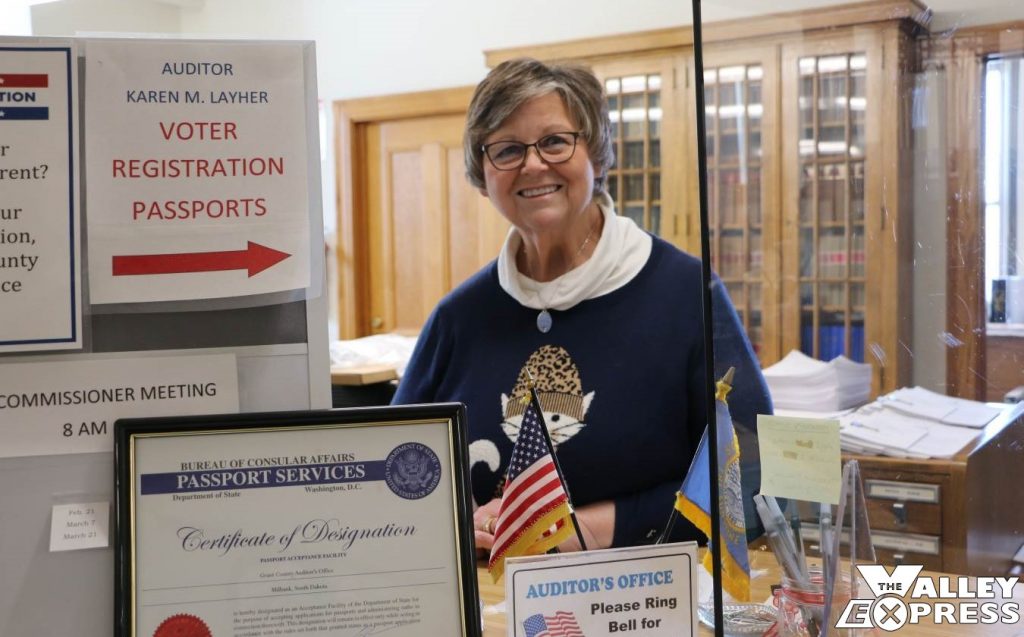
In case you’ve forgotten, the auditor is responsible for the apportioning of taxes collected by the treasurer, recording the official minutes of the county commissioners’ board meetings, maintaining all voter records, and administering all elections. As Karen says, “We calculate all the levies and process taxes. We get it out there.” There’s also another long list of things such as HR, insurance, and of course budgets.
“Government is like a major business,” she says. “The most difficult part is managing all the budgets to be sure they’re not overspending and make sure there’s cash. You gotta have a budget, and you gotta have cash. You can’t spend that budget if you don’t have the cash. Just like at home.”
Every day, Karen is up to her elbows in work she never dreamed she would be doing when she graduated from MHS, and she notes the most difficult part of the auditor’s job is being a jack of all trades.
She grew up in LaBolt and drove to Milbank High until her senior year in 1972, when LaBolt joined the Grant-Deuel School District. I preferred to graduate from Milbank, and the district told me I had to reside in the district to do that, so I lived with Bob Schreiner’s mom..”Mrs. Schreiner was a widow who lived in a little house over by where Bob and Donna’s family lived. “I stayed with her for half a year, and she and I got along great.”
Karen also worked at Wilson’s Department Store while she was in DECA (Distributed Education Clubs of America) in high school. “Jim and Virginia Wilson were very good bosses, and I loved working for them. Then, I worked for Lucy’s Fabrics, which was located on Main Street, where the Milbank Mall is now, before I went to Mutual.” But her first job was delivering newspapers for the Watertown Public Opinion in LaBolt. “I saved my money and I bought my first horse, Rusty, with my paper route money. I still love horses.”
When the kids go to the fair – both my kids and granddaughters go to the state fair – I’m left at home taking care of nine horses, three dogs, and numerous barn cats. All three houses have indoor cats and usually the girls have rabbits and things.”
She points to a box she is packing up before her last day as auditor on February 28. It’s brimming with horse figurines. “Those are gifts from my kids. Her children are Hillary (Schwagel) and Justin, and she has four granddaughters and one grandson, that’s in heaven. She points to one of the figurines and explains “That one represents standing on the Twin Towers. And this one represents all the broken glass of the Twin Towers – it’s the 20th anniversary one.”
The horses and our conversation seem to unleash a flood of memories and she reminisces for a while about her first rodeo as head of elections. “Because I started here in October of ‘90, my first election as the auditor was in November. I went home at 2 a.m. and got stuck halfway up my driveway. It had turned into a blizzard that night!
During another election, I left at 7 a.m. That one was a hand count. It turned into about a 26-hour work day. We all went home and showered and came right back.”
And those days don’t even include all the time leading up to an election. She says, “I usually just deliver the supplies to the precincts in Milbank and the ones close by, and the rural precincts pick up their supplies when they’re here for election school.”
“We go out all day on that Monday before the election and set up the voting booths and AutoMARK or ExpressVote machines. Wednesday is teardown day, when everything is brought back in and we start the clean up process.”
“That’s our busy time,” she says. “But after we held election school, I always felt the intensity level and my anxiety got better because I knew I had turned it over to good workers. People don’t realize how much work there is to do for an election.”
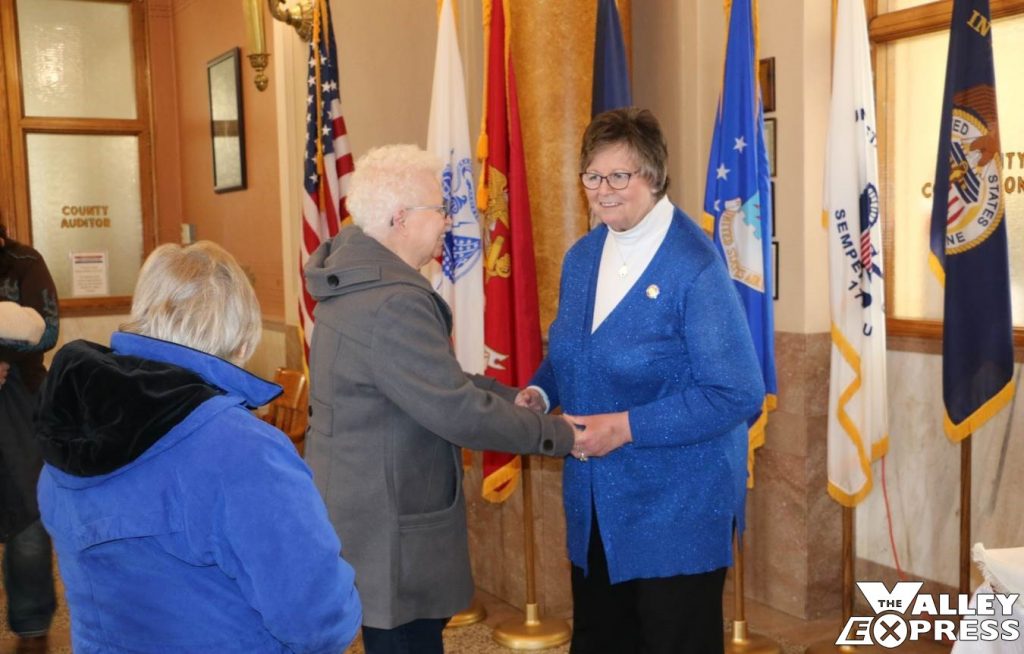
Karen does not foresee Grant County discontinuing paper ballots and says, “I fully support that. I hope the state doesn’t change that and I don’t feel South Dakota will because it’s easy to do a physical recount of a paper ballot. I’ve had two recounts in my 30 years here, and it takes a full day just to count.”
People have been predicting for decades, however, that the auditor’s office will soon be paperless. ”Everybody says, well, you’re gonna be paperless. ‘No, this office will never be paperless,’ I say. Everything is scanned or saved in a digital file format, but some items still require paper copies. “Some of the books like tax register books must be kept, that’s permanent storage and election results, that’s permanent storage. After 25 years it’s transferred to the Secretary of State’s office,” she adds. “I had the janitor build storage units to keep the election materials under lock and key.”
According to Karen, over the years, voter turnout has stayed fairly consistent. She believes the biggest change to elections in Grant County has been the technology used to count the votes. “The election workers are so appreciative of that. No more long hours at the polls because, I mean, they’re already there 13 hours that day from start to finish. Typically, we’re done now by 10:30 p.m. We start at six in the morning.”
Getting rid of multiple ballots is another way she thinks the election process has been streamlined. Different colored ballots formerly were used for different issues. “I think in my first election we had six ballots,” she recalls. “Candidates were on one ballot, but if we had a water district race, that was on a different ballot. If we had a judge race, that was on a different colored ballot. So voters received multiple ballots. Now everything’s just on one.”
“I’ve always told the staff the best election is when you don’t make the news,” Karen says with a laugh. “It’s our job to make sure everything runs smoothly. I like the planning; I like the logistics. An election is similar to a big party. You have to make sure everything is there and in order.”
Things around her haven’t always gone off without a hitch, though. During her time at the courthouse, she has experienced a few unusual circumstances.
“I remember December 31,1999, when we were sitting in the basement of the detention center waiting for the computers to go down at midnight. We had put a Y2K bug plan in place. We probably stayed there until about 1 or 2 a.m.”
“I also remember the scare of the white substance,” Karen says. She is referring to the more than 800 anthrax attacks and hoaxes involving baking soda, sugar, baby powder, etc., that were reported over a span of about a decade. We found some in the courthouse once. It was powder, but it turned out to be nothing to worry about. Nothing harmful.”
“I also recall the day I watched Sheriff Mike Mckernan chasing a prisoner down the steps. And, I remember finding out one day I had walked into the courthouse that morning and hadn’t noticed the sharp shooters on the roof.”
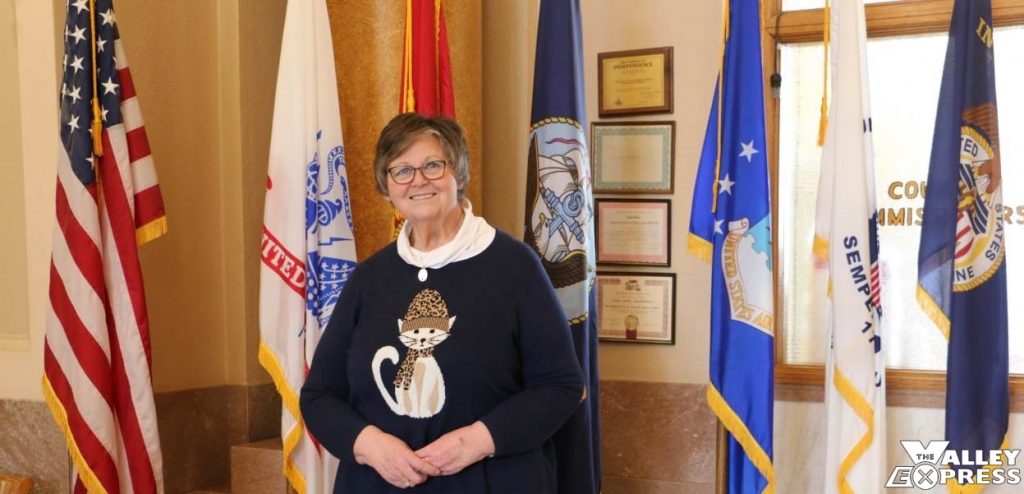
Even as the big bad world tends to creep into our community, conducting business at the courthouse with Karen manages to retain some of its old-school charm. Karen says, “Some of the auditors are surprised and ask me, ‘You make coffee for the commissioners?” I say, ‘Yes I make coffee for them.’ They often respond, ‘I wouldn’t do that,’ but I say, ‘Why not be cordial?’”
“I’ve had a good relationship with every board member. They’ve all brought their talent to the table. My boards could disagree on a topic, but when they walked out that commissioner room door, it was left at the table and they were friends. Once the vote was done it was supported by everyone.”
Sometimes in the boardroom you might even find a plate of cookies on the table. Karen explains, “I would rather bake than cook. I think it’s because of my Norwegian sweet tooth. Also, I was in 4- H as a kid. My first club was the Sunshine Club, which was Susie Winquist’s outside of LaBolt. I didn’t have any animals. It was crafts, sewing, and baking.
During her married life she also did more baking than cooking. She says her husband, Charles, who passed away in 2021, did most of the cooking and he was a good cook. “He was always home before I was. He got off earlier when he worked at Cold Springs (37 years) so he would make supper. I could cook, but he liked to. We’d eat at about 5:30 so he could go out to the farm and help his dad.”
Charles also served in Operation Desert Storm and Operation Iraqi Freedom with the National Guard. His first tour was six months and his second about a year and a half so he spent about two years in the desert.”
“I remember the second time Charles got deployed, Justin was in high school, and one of the first things he asked when he heard the news, was, ‘Who is going to cook?’”
Family life proved challenging while Charles was in Afghanistan and Iraq, but it was a stress Karen was sometimes unaware of. “To be honest, I thought to myself, I’m handling this well. And, things did go well, but I noticed my personality came back, after he got back home,” Karen admits. “When he would call and ask how everything was going? I’d always say, ‘Fine’. I would never say, ‘I’m struggling, the kids are struggling’ because you never want them to worry about you at home. Fortunately I had good kids. And, Boy does Milbank support the 740th! It’s a great community for veterans and service organizations.”
Now that she is passing on the title of auditor to someone new, one of the things she is proud of is the steadiness of the county’s finances. “When I started, we were pretty low on cash,” she says. “So I’m pleased the county is financially stable, but that takes all of us. There’s a good working relationship with all the departments, and I find all of them fiscally responsible. They budget for what they need, not so much what they want.”
Kathy Folk will officially take over as the Grant County Auditor on March 1. Folk petitioned, ran unopposed, and was elected last November. The auditor’s term ends February 28 due to the timing of annual reports. It varies from the other elected officials’ terms, which usually begin January 1.
Karen is thrilled to be staying in the courthouse to work and her title will be commission assistant. She will transition and help develop the new position. “We split the office duties. So, as per statute, the auditor will handle the financials and elections. I will work for the commissioners and do HR. I’ll take care of their correspondence and contracts, work with the state’s attorney, and do more with policies and long-term planning.”
Will she have a souvenir to remind her of her years as the auditor? This is all government property, of course, she says. But she points out another box of plaques and trophies she has been packing up and rattles off some of the organizations that go with them. “I was named an outstanding county official and served as state president on a couple national committees for finance. I’m the treasurer for the Grant County Historical Society. I became a charter member of the Historical Society in 1971, when I was a junior in high school. I served as president of the Millbank American Legion Auxiliary for maybe about 12 years. I’ve done Sunday School, the Tri-State Horseman’s Association, and was the Whetstone Valley Rodeo Association’s treasurer for years, she pauses and looks surprised. I guess I’ve forgotten all the things I’ve been involved in.”
“I like service work. I love helping people and the government is a service job. It is,” Karen emphasizes. “And we need to be reminded of that. There’s a sign back by the vault that says: A taxpayer is the most important person ever in this building…in person, by mail, or by telephone. A taxpayer is not dependent on us. We are dependent on him. A taxpayer is not an interruption of our work. He is the purpose for it. We are not doing him a favor by serving him. He is doing us the favor by giving us the opportunity to do so.’ And with a smile, she says, “That’s the truth!”
An open house honoring Karen on her retirement after 30 years as the Grant County Auditor was held at the Grant County Courthouse today, February 21. Top Photo: Janet Eastman, Justin Layher, Hilary, Emersyn, Brooke, Karen, Cassidy and Bailey Schwagel.












No comments so far.
Be first to leave comment below.